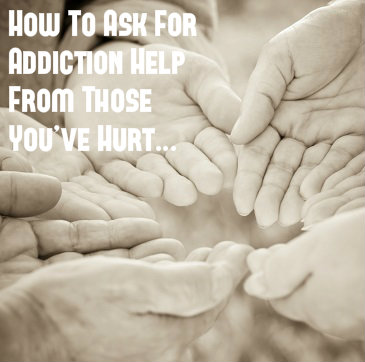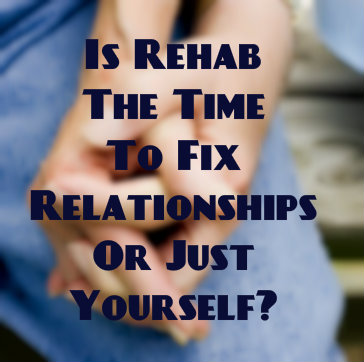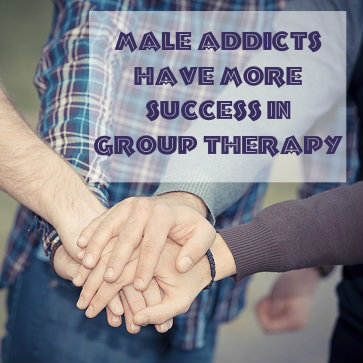15 Jul 2014
5 Ways To Open Up In Recovery
It’s natural to feel resistant about going to rehab for your addiction. Seeking treatment means a whole world of new possibilities, many of which are frightening. You might fail the first time around. You might succeed and get sober only to realize you have no idea how to live without drugs or alcohol. These fears and resistance to going into rehab and therapy can make you want to clam up. Your best chance at successful recovery comes when you give yourself fully to the process, and this means opening up, sharing your weaknesses, and likely feeling vulnerable. Here’s how to get past your fears and misgivings and open up to your therapist and fellow recovering addicts.
5 Ways To Open Up In Addiction Recovery
 1. Commit To The Program
1. Commit To The Program
Despite all your reservations, fears and uncertainties, give yourself the best chance of success by committing to your treatment program from the beginning. If you go into rehab with a positive attitude and the willingness to do what it takes to get well, you will find it easier to open up to others as a part of your treatment.
2. Listen First
If you are feeling hesitant about opening up in therapy or group sessions, give yourself a little time to get comfortable. This is a completely new experience and you are out of your element. As you settle in, listen to those around you. Listen to your fellow patients opening up in group therapy. Absorb what they have to say and notice how the others react. No one is ridiculed for sharing personal stories and feelings, right? Listening to others will help you to realize that you are in a safe place and will help you feel comfortable about talking when it’s your turn.
3. Start A Journal
Opening up to others is a big step. Start with a baby step if you’re finding it difficult to do. Open up to yourself by writing down what you want to share with your therapist or your peers. As you begin to write down what you feel and what you have experienced, the task of saying these things aloud, and to others, will become easier to do.
4. Let Your Therapist Be Your Guide
You may not be asked to open up in a group session on the first day, but your counselor or therapist will want to hear from you in one-on-one talks right away. This may be easier than talking to a small group, but it’s still tough. Remember that your therapist is there to guide you through your treatment. Let her guide your sessions and what you talk about. The pressure is not all on you to decide what to say. Once you get going you may just find that you can’t stop talking.
5. Know When Not To Open Up
Your rehab facility, and especially your time with your therapist, should feel safe. While it’s natural to feel reluctant to speak up at first, you should be able to relax into the process of talking about yourself. If you just can’t do it, or your gut is telling you that something isn’t right, you might not be the problem. Not all programs or therapists are created equal. If you feel uncomfortable where you are, get out and find a program or a therapist that does feel right.
Opening up is never easy. When you have so much bottled-up shame and guilt because of your addiction, getting your feelings out in the open is both a challenge and a catharsis. Take steps toward opening up and you will reap the rewards of a true breakthrough.
See Our Other Posts With Helpful Recovery Tips – Recovery Is Possible!
10 Jul 2014
What, You’re An Atheist? You’ll Never Get Sober!
Atheists in AA may get the impression that they’re going to have it tough. All the talk of a higher power might be abhorrent to you, and like The Fix writer Bill Manville, you might be told that “Booze is too tough to beat all alone without the help of Jesus and His Infinite Mercy.” But is this really true? If you’re an atheist, is AA just a waste of time because it requires you to accept something you can’t fathom? Bill wondered this himself, but he attended anyway and—aside from one short relapse—has been sober for 20 years. So how did he do it? Esprit de corps, or in English: group cohesion.
Lyrics Without The Music: Drawing Parallels With Addiction Recovery
 Manville asks if you’ve ever read the lyrics to a popular song without the music pumping along to back it up. If you have, you’ll have undoubtedly noticed that without the thumping beat, the power of the words is diminished. It’s only when those lines are spoken with the incorporeal addition of the feel and strength of the music itself that they take on an almost mystical sense of meaning and importance.
Manville asks if you’ve ever read the lyrics to a popular song without the music pumping along to back it up. If you have, you’ll have undoubtedly noticed that without the thumping beat, the power of the words is diminished. It’s only when those lines are spoken with the incorporeal addition of the feel and strength of the music itself that they take on an almost mystical sense of meaning and importance.
He draws the analogy between this and addiction treatment. When you attend lectures on addiction, learn about the consequences, causes and anything you can about your problem, it’s like reading the lyrics without the music. You understand the meaning in a flat, emotionless sense (and the message that you should stop abusing drugs) but you don’t have thumping, powerful drive underpinning it all that motivates you to action. It’s missing the music.
The Therapeutic Community And AA
The rehab Manville eventually attended called itself a “therapeutic community,” with a counselor commenting that, “it’s the existential experience of going through the process with a bunch of other addicts and drunks—all of whom want to stop too—that changes the self.” Despite his initial skepticism, he found himself beginning to understand the importance of this community aspect.
He likens it to the Army, where the tough experience of basic training builds a group morale that gives the otherwise uninspired the motivation to rush into enemy territory to complete the mission at hand. The fact that you’re part of a larger group that shares your mission and has experienced the same sort of problems you have gives you that same type of motivation. You aren’t just one person being asked to tackle addiction alone. You’re part of a larger, stronger group and that in itself gives you the motivation to fight.
Getting Sober Without God
In AA, the “higher power” doesn’t have to be a deity, to the relief of any addicted atheist. Manville found his higher power in a different place: the esprit de corps and the desire to socially fit in with the new group did it for him. That was where the music came from. His theory is explained perfectly in his attitude to the Lord’s Prayer as an atheist. He writes, “When I join hands with fellow members at the end, I feel so buoyed by this merging of self into the greater whole that I find myself reciting the Lord’s Prayer aloud just like rest, and if there is indeed a God listening above, I hope my over 20 years sobriety will make Her smile.”
Becoming Empowered Without Religion
The feeling of being part of a larger group gave Manville his power to overcome addiction, but the important lesson for atheists in AA isn’t that you need to embrace the group or you won’t get sober. Embracing and connecting with the group is important for many other reasons, but the thing that spurs you on personally (the “music” for you, if you will) can be anything that works for you.
The true lesson from Manville’s story is that atheists in AA need to understand that you don’t need God to get sober, just something—anything—that takes the intellectual lessons you’ve learned and provides the underlying vigor you need to turn them into reality. Becoming part of the group is just one potential solution. You need to find the one that works for you.
Learn More About Alternative Addiction Therapies
Asking for help is never easy. It means admitting something you’d rather not and that you need other people. When you need help for addiction you may also feel ashamed or guilty. Perhaps most difficult is asking for help from the loved ones who have suffered because of your addiction. Asking for help is crucial because no one can overcome addiction alone. Be brave and talk to the loved ones you hurt. You may be surprised to find they still support you, no matter what.
How Do I Get Past the Shame Of Addiction?
 Shame is a terrible symptom of substance abuse and addiction and a common roadblock to asking for help. Understand that it is normal to feel this way. The natural response to the shame that accompanies addiction is to bury it and to deny having a problem, but this won’t help you in the long run. Shame means realizing that you are imperfect and once you accept that fact, asking for help becomes easier. No one is perfect and knowing this fact can help you connect with your loved ones who will most likely be ready to support you, even though you hurt them in the past.
Shame is a terrible symptom of substance abuse and addiction and a common roadblock to asking for help. Understand that it is normal to feel this way. The natural response to the shame that accompanies addiction is to bury it and to deny having a problem, but this won’t help you in the long run. Shame means realizing that you are imperfect and once you accept that fact, asking for help becomes easier. No one is perfect and knowing this fact can help you connect with your loved ones who will most likely be ready to support you, even though you hurt them in the past.
Learning more about your addiction can also help you to let go of shame. Read up on addiction and the latest research findings and you will see that it is a disease. Being addicted started with a choice you made, but it persists because it is a true illness that affects you physically and psychologically.
How Do I Get Past The Fear Of Rejection?
Another major roadblock to asking your loved ones for help is the fear that they will turn their backs on you. Why shouldn’t they? After all, you have broken their trust, let them down and maybe you even hurt them emotionally or physically because of your addiction. You probably see yourself now as unworthy of their love and help.
You have to see yourself as worthy of your loved ones’ time and attention. If you can’t see that, you may never ask for the help you desperately need. Think back to a time before your addiction. Remember the kind of person you were and the relationships you had with your family. Maybe you and your sister were best friends. You can probably remember a time when you were a help to your parents, rather than a burden. When you can remember the positives in the past, you can imagine a future in which you are sober again. Your loved ones will remember the old you too and will not likely reject your request for help.
How Do I Ask For Help?
Once you have recognized, acknowledged and gotten past your shame and fear, it’s time to take action. First, pick the person you think is most likely to be ready and willing to support you as you seek recovery from your addiction. For most people this means turning to a close family member, like a parent or a sibling. You know your family and friends best, so choose the person or people you think will help you in spite of all you have done to hurt them.
It never hurts to practice, so plan what you want to say. You might want to start with apologies, but be sure to stick with the main message, which is that you are ready to get help. Acknowledge out loud to your loved ones that you hurt them. They will appreciate that you are not ignoring your past wrongs. Also find a time that is conducive to a long talk. Don’t stop your loved ones on their way out the door. Take the time to find your voice and the courage you need to speak up. You may be pleasantly surprised to find that your loved ones are still there for you.
Read Our Other Inspirational Addiction Posts – Healing From Addiction Can Be Yours Today!
Deciding to admit to your problem with addiction is a big accomplishment. Denial and fear are major roadblocks that keep so many addicts from ever coming clean. Once you have made the admission and decided to get help, though, you still have many steps to go until you reach sobriety and recovery. The first step is detoxification, or detox. What happens during detox may be uncomfortable and painful, but it will bring you through to the other side and set you on the path to your personal recovery journey.
What Do You Do In Drug Rehab?
 Drug rehab is how you move from the world of addiction to a life of sobriety. It is a transition period that will help to transform you. The first part of rehab is detox, although some facilities require that you detox before you even get there. In this case, you can find a location that specializes in detoxing before you enter your long-term rehab facility.
Drug rehab is how you move from the world of addiction to a life of sobriety. It is a transition period that will help to transform you. The first part of rehab is detox, although some facilities require that you detox before you even get there. In this case, you can find a location that specializes in detoxing before you enter your long-term rehab facility.
Once you have completed a detox, you will go through a series of counseling sessions and other activities designed to help you learn more about yourself and your addiction. One-on-one therapy sessions are personal and will help you get to the root of your problem. Group work will help you empathize with others and learn from their experiences. Other activities help you to relax without using drugs or alcohol and teach you strategies for staying sober.
What Happens During Detox?
Your first step in the process of recovery is detox. What happens during this step is that your body is cleared of all substances so that you are completely sober and ready for the rest of your journey. During this process you will experience the symptoms of withdrawal: irritability, restlessness, anxiety, insomnia, nausea, headaches, vomiting, diarrhea and more. It is unpleasant, painful and difficult, but it is necessary.
Are There Different Kinds Of Detox?
Different facilities may offer different ways of detoxing. Many will simply do it the natural way: allowing your body to eliminate the drug or alcohol over a period of several days without much intervention. Some facilities may offer medicated detox, which involves giving you medications to relieve some of your withdrawal symptoms. Others may offer rapid detox. This means putting you under anesthesia for a couple of days so that you essentially sleep through your detox. This is a controversial method, but one many people find attractive.
Any successful drug rehab includes a period of detox. You cannot begin to enter recovery until you have stopped abusing substances and let the drugs and alcohol pass completely from your body. With the right professionals on your team, you can get through it and come out on the other side ready for rehab.
Read More About The Origins And Developments In Detox Addiction Treatment
01 May 2014
Is Repairing Your Marriage After Rehab Possible?
Few things take a greater toll on relationships than addiction. If you are an addict in recovery and you are married, you may be wondering what will happen next. Is your spouse going to leave you? Will she ever trust you again? How will you ever make it up to her? Divorce in the aftermath of addiction is not uncommon, but it is possible to repair your marriage. You can make it up to your wife if you are both willing to do the work. The fact that you sought recovery is a sign that you can work toward repairing all aspects of your life damaged by addiction.
Is Divorce Inevitable After Addiction?
 Divorce may be common when one partner is addicted, but it does not need to be inevitable. Addiction is one of the biggest challenges your relationship will ever face, but you can bring it back from the brink. To do so, you both need to be on the same page. Have an honest and open discussion with your wife and find out if she is committed to working with you to repair your relationship. She may have doubts, but hopefully the fact that you were willing to ask for professional help will convince her that you are serious about making amends.
Divorce may be common when one partner is addicted, but it does not need to be inevitable. Addiction is one of the biggest challenges your relationship will ever face, but you can bring it back from the brink. To do so, you both need to be on the same page. Have an honest and open discussion with your wife and find out if she is committed to working with you to repair your relationship. She may have doubts, but hopefully the fact that you were willing to ask for professional help will convince her that you are serious about making amends.
How Do You Make Amends To Your Spouse?
Making amends is an important part of the recovery process and no one deserves it more than your partner. Addiction leads people to do hurtful things to the ones they love the most. You may have lied to her, cheated on her or neglected her. You have a lot of making up to do, and although it may seem daunting, it is possible.
Making up for all the hurt and damage does not mean that you have to spend the rest of your life groveling and giving in to your spouse. If that is what she is expecting, you are both headed down the wrong path. Making amends means apologizing and restoring her faith in you. To do so you need to treat her well, make heartfelt apologies and, most importantly, strive to avoid relapsing and sinking back into the hole of addiction.
Can Your Spouse Ever Trust You Again?
One of the biggest impediments to bringing back a healthy relationship is trust. What you damaged the most in your marriage was your wife’s trust. You probably promised over and over again to stop using, to stop lying, to stop cheating, and to be better. These were all promises you were incapable of keeping at the time, but they did damage to trust nonetheless.
The only way to develop trust is to earn it. Unfortunately, earning trust takes much more time than losing it. It takes many repeated instances of being reliable and dependable to earn trust. Make sure your wife understands that her trust will be slow to regain. Keep being the person she needs you to be, and with time, she will trust you again.
Repairing a marriage after the devastation caused by addiction is a difficult challenge, but not an impossible one. Be sure to communicate with each other about what you are feeling; rekindle your love for each other by spending quality time together and consider seeking the help of a professional marriage counselor. Perhaps most importantly, continue to work on your own recovery. The best way to show your spouse that you are committed to rebuilding your relationship is to stay sober and avoid relapse.
Find Out What Are The Ways To Recognize Addiction Denial In A Loved One?
22 Apr 2014
Repairing Broken Relationships While In Rehab
You have finally made the decision to get into rehab and get help for your addiction. Your habit has probably wreaked a lot of havoc in your life. You may have chronic health problems, your finances may be in the toilet, you may have lost your job, or you may have gotten into legal trouble. Perhaps the worst casualties of your addiction, however, are your relationships. Addicts often hurt the ones they love while focused solely on the needs dictated by their disease. Now that you’re going into rehab, should you work on those relationships or focus on your recovery alone?
What Are the Most Important Relationships In Rehab?
 As you enter rehab you will find that there are several relationships to cultivate. You will need to develop a working and trusting relationship with your counselor or therapist. This person will be instrumental in helping you to get better. You do need to work on this relationship, but remember that it is a professional one. If you struggle to trust this person, be honest about it. Your therapist will not take it personally if you want to request to work with someone else.
As you enter rehab you will find that there are several relationships to cultivate. You will need to develop a working and trusting relationship with your counselor or therapist. This person will be instrumental in helping you to get better. You do need to work on this relationship, but remember that it is a professional one. If you struggle to trust this person, be honest about it. Your therapist will not take it personally if you want to request to work with someone else.
You will also find that you will develop several relationships with peers while in rehab. These are crucial to your success. No one can go it alone, especially when trying to overcome addiction. Your peers have the unique perspective that you also have. They understand where you have been, where you’re going, and what your experience in rehab is like. While leaving romance out of the picture, which can complicate things, cultivate relationships with these people who will be able to support you during rehab and for years to come.
Can I Work On Repairing Relationships In Rehab?
In addition to the professional and peer relationships that you develop in rehab, you will also begin to forge a relationship with yourself. You will begin to learn more about your motivations for abusing substances, why you were susceptible to addiction, and how you can stay sober. This is essential to your recovery, and should be your main focus.
Although you are focusing on yourself, you may still be able to work on the relationships you damaged with your addiction. Consult your therapist to decide whether it is best for you to wait or to delve into that project while in rehab. If you both think you can handle getting to work on relationships, your therapist may want to set up family sessions. Together you can work toward regaining the trust of your loved ones and they can start to forgive you.
What If I Wait Until After Rehab To Fix Relationships?
If you and your therapist feel you need to focus solely on yourself during rehab, bring in your loved ones so that your therapist can explain the decision. They may feel hurt initially and wonder when it will be their turn. Your therapist can help them to understand the importance of devoting rehab time to your immediate needs.
Another option is for your loved ones to begin their own therapy sessions. The impacts of your addiction have probably hurt them, caused them to feel angry and used, or even traumatized them if abuse was involved. If your loved ones can begin to work with a therapist while you go through rehab, you will all be on the right track toward repairing your relationships together.
11 Apr 2014
How To Forgive Your Alcoholic Parent
Forgiveness, as the experts say, is a choice. If someone has wronged you, you cannot wait for forgiveness to appear. You must make a conscious decision to forgive. You also cannot wait for the person who wronged you to apologize. It may never happen. Forgiving someone is a personal choice and one that can give you many benefits. Researchers know that by actively forgiving, you can expect to experience less stress, better relationships, less depression, and even lower blood pressure and a lowered risk of substance abuse.
If the forgiveness you are considering means letting go of the harm and neglect you faced as a child because of a parent’s alcoholism, it will not be easy. Whether your alcoholic parent physically abused you, or simply was never there for you emotionally, you suffered greatly as a result. Forgiveness may be something you have considered, but are struggling to get through. With some understanding, compassion, and a suspension of resentment, you can forgive and move on with your life.
 The Harm Caused By An Alcoholic Parent
The Harm Caused By An Alcoholic Parent
The reason forgiving your mother or father is so difficult is that they caused so much damage in your life. When the children of alcoholics become adults they often experience their own struggles with substance abuse. You are also vulnerable to depression, you may have low self-esteem, and you probably struggle to maintain healthy relationships. If you were physically abused by your alcoholic parent, the repercussions may be more extreme.
Can You Learn To Understand An Alcoholic?
If you have managed to avoid having a substance abuse problem yourself, you may have a hard time understanding your alcoholic parent. However, your path to forgiveness may begin with compassion and understanding. Read up on the disease of alcoholism and try to learn why certain people are vulnerable to it and the impact it has. You may even want to talk to your mother or father about it. If he or she is willing to open up, you can learn just what the struggle has been like. Maybe your parent experienced abuse as a child. If you can understand the motivation behind your parent’s drinking, you may find the compassion to forgive.
Can You Let Go Of Resentments?
One of the biggest roadblocks to forgiveness is resentment. This ugly specter lives with you day in and day out. The more you think about how your alcoholic parent impacted your life in a negative way, the bigger this resentment becomes. It is a toxic feeling and will hinder you in everything you do. Even if you cannot yet forgive your parent, learn to let go of the resentment so that you can better function.
Remember The Good Times
Few alcoholic parents are so terrible that they never cared for their children at all. As you try to let go of resentment and attempt to cultivate compassion, think back to your childhood and try to remember the happy moments. Make a list of all the memories of a happy and caring parent. Remembering these moments and the feelings that accompanied them will help you to journey closer toward forgiveness.
Forgiveness is a choice, and it is a healthy one. Your life will only get better when you are able to forgive your parent. You will be able to rebuild a relationship and you will be able to let go of resentment. You will feel as if a weight has been lifted from your shoulders.
Find Out How Recovering Alcoholics Respond To Baclofen
As a rule, people affected by drug or alcohol addiction benefit from some sort of psychological or behavioral counseling that can help them successfully discontinue substance use and learn how to maintain substance abstinence over time. Some treatment programs feature individualized counseling sessions that only include a therapist and a single patient, while others feature group counseling sessions that include a therapist and multiple patients. In a study published in late 2013 in the Journal of Groups in Addiction & Recovery, researchers from two Canadian institutions compared the rate at which participants in individual counseling-oriented programs successfully complete addiction treatment to the rate at which participants in group counseling-oriented programs complete addiction treatment.
What Is Individual Counseling?
 Individual counseling-based programs for addiction treatment rely on a therapeutic relationship between a therapist and a single patient/client to achieve the treatment objectives common to all forms of substance-related counseling. Typically, individual therapy takes place in sessions that last 30 minutes to an hour; the specific techniques used in each session depend upon the therapist and the guiding principles of the program in which he or she is involved. In most cases, a recovering addict participates in a single one-on-one session with his or her therapist per week. However, some programs make provisions for as many as three or more sessions per week or for sessions that only occur every 30 days or more. Because of its relatively high cost, individual therapy is used less often than group therapy as a treatment for substance abuse or substance addiction.
Individual counseling-based programs for addiction treatment rely on a therapeutic relationship between a therapist and a single patient/client to achieve the treatment objectives common to all forms of substance-related counseling. Typically, individual therapy takes place in sessions that last 30 minutes to an hour; the specific techniques used in each session depend upon the therapist and the guiding principles of the program in which he or she is involved. In most cases, a recovering addict participates in a single one-on-one session with his or her therapist per week. However, some programs make provisions for as many as three or more sessions per week or for sessions that only occur every 30 days or more. Because of its relatively high cost, individual therapy is used less often than group therapy as a treatment for substance abuse or substance addiction.
What Is Group Counseling?
Group counseling-based programs for addiction treatment rely on the natural human dynamic of group interaction to achieve typical goals such as regular attendance at counseling sessions, avoidance of a relapse back into substance use and the establishment of a solid foundation for ongoing substance abstinence. Depending on the program in question, group therapy can place a particular emphasis on any one of a number of recovery-related issues also commonly addressed in individual counseling-based programs. These issues include educating participants about various aspects of abuse and addiction, helping participants understand their underlying psychological/emotional motivations for substance use and helping participants establish mental and behavioral skills that can form the basis for a substance-free daily routine. Recovering addicts enrolled in group counseling-based programs may attend regular group sessions for as long as half a year to a year.
Comparing Completion Rates Of Both Types
In the study published in the Journal of Groups in Addiction & Recovery, researchers from Canada’s Western University and the Centre for Children & Families in the Justice System compared the rate of client/patient retention in individual therapy programs for substance abuse/addiction to the rate of client/patient retention in group therapy programs. They decided to undertake this work after finding out that the vast majority of voluntary enrollees at a Canadian agency for addiction treatment failed to complete their program participation.
The researchers concluded that the average recovering addict enrolled in a group therapy-based program is roughly 100 percent more likely to successfully complete his or her treatment than the average recovering addict enrolled in an individual therapy-based program. However, they also concluded that the majority of the difference in success rates between the two counseling approaches is gender-related. Broadly speaking, men participating in addiction recovery are more likely than women to drop out of any form of treatment. Still, men who participate in group therapy-based programs have a much higher treatment completion rate than men who participate in individual therapy-based programs. Conversely, the researchers found that women tend to complete individualized addiction therapy just as often as they complete group addiction therapy.
The conclusions made by the authors of the study published in the Journal of Groups in Addiction & Recovery indicate that doctors may need to take their patients’ gender into account when making recommendations for participation in either individual therapy or group therapy for addiction treatment. Further research will be needed to fully confirm the gender-related differences in the program completion rates among recovering addicts. While some programs rely only on individual therapy or group therapy, others combine the two approaches, largely because each approach typically produces some unique potential benefits for participants. This means that men in some programs who don’t respond well to individual therapy may still achieve their treatment objectives through regular attendance at any available group therapy sessions.
Read About How Drug Rehab Programs Rely On Science To Develop Effective Addiction Treatment Methods


